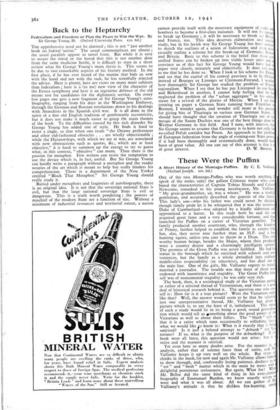Back to the Heptarchy
Federalism and Freedom or Plan the Peace to Win the War. By Sir George Young, Bt. (Oxford University Press. I2S. 6d.) THE apprehensive need not be alarmed ; this is not "just another book on federal 'union." The usual commonplaces are absent ; the usual parallels appear in novel form. But while it is easy to assure the timid or the bored that this is not another dose from the same medicine bottle, it is difficult to state in a short review what Sir George Young's main thesis is. This seems to be due to two remarkable aspects of his literary method. In, the first place, if he has ever heard of the maxim that bids us sow with the hand and not with the sack, he has scornfully rejected the advice. Here is plenty, here are views on many more subjects than federalism ; here is a (to me) new view of the character of the Eroica symphony and here is an ingenious defence of the old means test for candidates for the diplomatic service. On every few pages one gets a new fragment of Sir George Young's auto- biography, ranging from his days in the Washington Embassy, through the German and Russian revolutions down to his dealings with Anarchists in the Spanish civil war. It is all done in the spirit of a fine old English tradition of gentlemanly eccentricity, but it does not make it much easier to grasp the main themes of the book. To the difficulties caused by this rich disorder Sir George Young has added one of style. He finds it hard to resist a jingle, so that when one reads "the Ottawa preferences and other old-fashioned obstacles . . . are wholly objectionable ; while the Dictatorships, with which we are at war, are associated with new obstructions such as quotas, &c., which are at least objective," it is hard to summon up the energy to try to guess what, in this context, " objective " can mean. Then there is the passion for metaphor. Few writers can resist the temptation to use the device which is, in fact, useful. But Sir George Young can hardly write a paragraph without a metaphor and the reader wearies of the art which is meant to help but really hinders his comprehension. There is a department of the New Yorker entitled "Block That Metaphor." Sir George Young should really study it.
Buried under metaphors and fragments of autobiography, there is an original idea. It is not that the sovereign national State is evil, but that the large national sovereign State is evil or dangerous. This is a truth worth pondering ; the powers of mischief of the modern State are a function of size. Without a minimum of industrial resources and territorial extent, a nation
cannot provide itself with the necessary equipment of tanks bombers to become a first-class nuisance. It will not be enou to break up Germany ; it will be necessary to break up Erna' and France, too. This idea deserves elaboration and care study, but in his lavish way Sir George Young has been coma to sketch the outlines of a union of federations and even nor casually outline a scheme for the break-up of Germany, Franc and Britain. Basic to this scheme is the belief that these ne unified States can be broken up into viable lesser units and I convince us of this fact Sir George Young would have had t argue very closely, minutely and objectively. It does not see to me that he has done so. When I look at his scheme for Fran, and see that the capital of his central province is to be One instead of Bourges or Limoges or Clermont-Ferrand, I woride how thoroughly Sir George has studied the problem of Fren regionalism. When I see that he has put Liverpool in one Su and Birkenhead in another, I cannot help feeling that he neglected the problem of the "urban aggregate" in his enthu siasm for a revival of the glories of Mercia. When I see If creating on paper a German State running from Frankfort Bremen, I wonder again, and wonder still more at his pass for giving bits of Thuringia to various new German States. should have thought that the creation of Thuringia out of th mosaic of the Saxon Duchies was one of the best things done b Weimar Germany in this field. And I note, with interest, th Sir George seems to assume that Germany is to keel, not only r so-called Polish corridor but Posen. An approach to the probl of European federation from the angle of evening-out State power if it had been thoroughly and systematically done, would has been of great value. All one can say of this attempt is that it


























 Previous page
Previous page